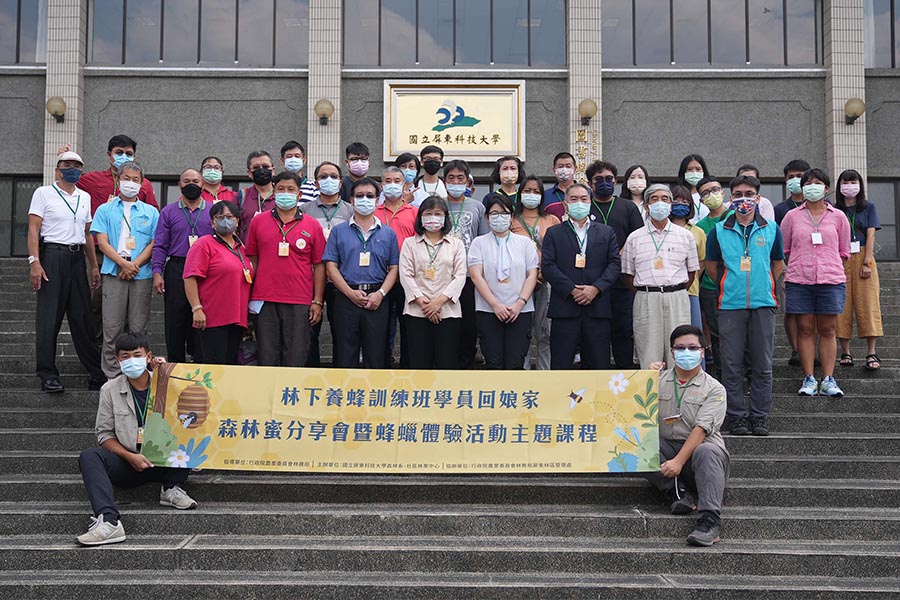A sweet convention took place on Sept. 9th, when NPUST and the Forestry Bureau invited bee experts and operators of under-forest community farms from across Taiwan to share information related to under-forest beekeeping and honey production. Some of those present included Shiyang Chang, Consultant of the Taiwan Beekeeping Association; Chih-Tsung Wang, Director of Fengshen Organic Bee Farm; Yu-Wen Chen, distinguished professor of Yilan University; and Ben-Han Chen, researcher at the Miaoli Agricultural Research and Extension Station.
Ever since the “under forest economic policy” was first launched, forest beekeeping has attracted a lot of attention. This, in turn, has created a noticeable demand for the knowledge and skills used in the trade. Over the past three years, the NPUST Community Forestry Center has held 13 offerings of the under-forest beekeeping course and equipped trainees from 55 communities across Taiwan. The forest beekeeping teaching base that the NPUST Department of Forestry established in 2017 has also served to accelerate the development of under-forest beekeeping and spread knowledge and skills on the subject. Many local tribes and communities in Taiwan have begun putting the skills they’ve learned in the course to practice, including the Jiamu Tribe, Ali Tribe, and Gaoshi Tribe in Pingtung; Mingde Community in Miaoli; Yanliao Community in Hualien; and the Duli Tribe in Taitung. During the convention, each group shared on the characteristics of the under-forest honey produced their region and their experiences from the cultivation process.
Shiyang Chang, consultant from the Taiwan Beekeeping Association, offered marketing advise to the small-scale producers, pointing out that initial consumers will be those who are interested in trying something new, so the honey should be packaged in smaller bottles; and since forest honey tends to crystallize, the bottles should have wide-mouths. Ben-Han Chen from the Miaoli Agricultural Research and Extension Station said that the first stage of training focuses on raising the bees; the second aims at quality expectations. Later, the cultivators can do more advanced things like develop pollen and other products—or promote environmental education programs. Finally, Chih-Tsung Wang from the Fengshen Organic Bee Farm raised some of the current questions associated with beekeeping, asking whether the Forestry Bureau could offer any information on the phenology of nectar producing plants. He pointed out that Taiwan’s forest honey cultivation is worth researching and developing, and it has many unique factors which distinguish it from standard models of beekeeping. He also hopes that the practice can benefit ecology by following the Satoyama spirit and that in the future APPs can be developed to aid the work.
The NPUST Community Forestry Center and the Forestry Bureau have been cooperating with local communities for many years. Together with the support of the Ministry of Education’s University Social Responsibility (USR) Project, forest beekeeping research, education, training and community counseling has been much more comprehensive. At least 22 of the trainees from the training course are already engaged in under-forest beekeeping and honey production. The average number of beehives per person is about 50, with annual output ranging from 500 kg to 6000 kg. Ninety percent of the honey is sold in branded packaging, and 30% of the partners have begun to produce secondary products, such as royal jelly, pollen, and beeswax. So far, the results have been quite fruitful.
Since the forests have not been polluted with pesticides, they are a welcome safe haven for bee colonies. The multi-level vegetation in the mountain forests also provide a stable source of pollen for the bees. Based on carrying capacity principles, forest beekeeping is a new model of beekeeping that works to protect both bee colonies and forest environments alike, while also providing the public with diverse flavors of healthy honey products. The situation is an all-round win; and based on the information shared at the convention, it looks like there is much more to come!

